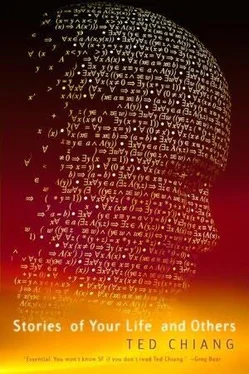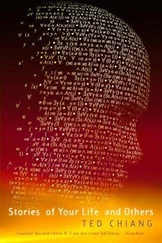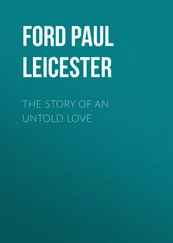Ted Chiang - The Story Of Your Life
Здесь есть возможность читать онлайн «Ted Chiang - The Story Of Your Life» весь текст электронной книги совершенно бесплатно (целиком полную версию без сокращений). В некоторых случаях можно слушать аудио, скачать через торрент в формате fb2 и присутствует краткое содержание. Жанр: Фантастика и фэнтези, на английском языке. Описание произведения, (предисловие) а так же отзывы посетителей доступны на портале библиотеки ЛибКат.
- Название:The Story Of Your Life
- Автор:
- Жанр:
- Год:неизвестен
- ISBN:нет данных
- Рейтинг книги:3 / 5. Голосов: 1
-
Избранное:Добавить в избранное
- Отзывы:
-
Ваша оценка:
- 60
- 1
- 2
- 3
- 4
- 5
The Story Of Your Life: краткое содержание, описание и аннотация
Предлагаем к чтению аннотацию, описание, краткое содержание или предисловие (зависит от того, что написал сам автор книги «The Story Of Your Life»). Если вы не нашли необходимую информацию о книге — напишите в комментариях, мы постараемся отыскать её.
The Story Of Your Life — читать онлайн бесплатно полную книгу (весь текст) целиком
Ниже представлен текст книги, разбитый по страницам. Система сохранения места последней прочитанной страницы, позволяет с удобством читать онлайн бесплатно книгу «The Story Of Your Life», без необходимости каждый раз заново искать на чём Вы остановились. Поставьте закладку, и сможете в любой момент перейти на страницу, на которой закончили чтение.
Интервал:
Закладка:
I remember when you’ll be a month old, and I’ll stumble out of bed to give you your 2:00 am feeding. Your nursery will have that “baby smell” of diaper rash cream and talcum powder, with a faint ammoniac whiff coming from the diaper pail in the corner. I’ll lean over your crib, lift your squalling form out, and sit in the rocking chair to nurse you.
The word “infant” is derived from the Latin word for “unable to speak,” but you’ll be perfectly capable of saying one thing: “I suffer,” and you’ll do it tirelessly and without hesitation. I have to admire your utter commitment to that statement; when you cry, you’ll become outrage incarnate, every fiber of your body employed in expressing that emotion. It’s funny: when you’re tranquil, you will seem to radiate light, and if someone were to paint a portrait of you like that, I’d insist that they include the halo. But when you’re unhappy, you will become a klaxon, built for radiating sound; a portrait of you then could simply be a fire alarm bell.
At that stage of your life, there’ll be no past or future for you; until I give you my breast, you’ll have no memory of contentment in the past nor expectation of relief in the future. Once you begin nursing, everything will reverse, and all will be right with the world. NOW is the only moment you’ll perceive; you’ll live in the present tense. In many ways, it’s an enviable state.
The heptapods are neither free nor bound as we understand those concepts; they don’t act according to their will, nor are they helpless automatons. What distinguishes the heptapods’ mode of awareness is not just that their actions coincide with history’s events; it is also that their motives coincide with history’s purposes. They act to create the future, to enact chronology.
Freedom isn’t an illusion; it’s perfectly real in the context of sequential consciousness. Within the context of simultaneous consciousness, freedom is not meaningful, but neither is coercion; it’s simply a different context, no more or less valid than the other. It’s like that famous optical illusion, the drawing of either an elegant young woman, face turned away from the viewer, or a wart-nosed crone, chin tucked down on her chest. There’s no “correct” interpretation; both are equally valid. But you can’t see both at the same time.
Similarly, knowledge of the future was incompatible with free will. What made it possible for me to exercise freedom of choice also made it impossible for me to know the future. Conversely, now that I know the future, I would never act contrary to that future, including telling others what I know: those who know the future don’t talk about it. Those who’ve read the Book of Ages never admit to it.
I turned on the VCR and slotted a cassette of a session from the Ft. Worth looking glass. A diplomatic negotiator was having a discussion with the heptapods there, with Burghart acting as translator.
The negotiator was describing humans’ moral beliefs, trying to lay some groundwork for the concept of altruism. I knew the heptapods were familiar with the conversation’s eventual outcome, but they still participated enthusiastically.
If I could have described this to someone who didn’t already know, she might ask, if the heptapods already knew everything that they would ever say or hear, what was the point of their using language at all? A reasonable question. But language wasn’t only for communication: it was also a form of action. According to speech act theory, statements like “You’re under arrest,” “I christen this vessel,” or “I promise” were all performative: a speaker could perform the action only by uttering the words. For such acts, knowing what would be said didn’t change anything. Everyone at a wedding anticipated the words “I now pronounce you husband and wife,” but until the minister actually said them, the ceremony didn’t count. With performative language, saying equaled doing.
For the heptapods, all language was performative. Instead of using language to inform, they used language to actualize. Sure, heptapods already knew what would be said in any conversation; but in order for their knowledge to be true, the conversation would have to take place.
“First Goldilocks tried the papa bear’s bowl of porridge, but it was full of Brussels sprouts, which she hated.”
You’ll laugh. “No, that’s wrong!” We’ll be sitting side by side on the sofa, the skinny, overpriced hardcover spread open on our laps.
I’ll keep reading. “Then Goldilocks tried the mama bear’s bowl of porridge, but it was full of spinach, which she also hated.”
You’ll put your hand on the page of the book to stop me. “You have to read it the right way!”
“I’m reading just what it says here,” I’ll say, all innocence.
“No you’re not. That’s not how the story goes.”
“Well if you already know how the story goes, why do you need me to read it to you?”
“Cause I wanna hear it!”
The air conditioning in Weber’s office almost compensated for having to talk to the man.
“They’re willing to engage in a type of exchange,” I explained, “but it’s not trade. We simply give them something, and they give us something in return. Neither party tells the other what they’re giving beforehand.”
Colonel Weber’s brow furrowed just slightly. “You mean they’re willing to exchange gifts?”
I knew what I had to say. “We shouldn’t think of it as ‘gift-giving.’ We don’t know if this transaction has the same associations for the heptapods that gift-giving has for us.”
“Can we—” he searched for the right wording “—drop hints about the kind of gift we want?”
“They don’t do that themselves for this type of transaction. I asked them if we could make a request, and they said we could, but it won’t make them tell us what they’re giving.” I suddenly remembered that a morphological relative of “performative” was “performance,” which could describe the sensation of conversing when you knew what would be said: it was like performing in a play.
“But would it make them more likely to give us what we asked for?” Colonel Weber asked. He was perfectly oblivious of the script, yet his responses matched his assigned lines exactly.
“No way of knowing,” I said. “I doubt it, given that it’s not a custom they engage in.”
“If we give our gift first, will the value of our gift influence the value of theirs?” He was improvising, while I had carefully rehearsed for this one and only show.
“No,” I said. “As far as we can tell, the value of the exchanged items is irrelevant.”
“If only my relatives felt that way,” murmured Gary wryly.
I watched Colonel Weber turn to Gary. “Have you discovered anything new in the physics discussions?” he asked, right on cue.
“If you mean, any information new to mankind, no,” said Gary. “The heptapods haven’t varied from the routine. If we demonstrate something to them, they’ll show us their formulation of it, but they won’t volunteer anything and they won’t answer our questions about what they know.”
An utterance that was spontaneous and communicative in the context of human discourse became a ritual recitation when viewed by the light of Heptapod B.
Weber scowled. “All right then, we’ll see how the State Department feels about this. Maybe we can arrange some kind of gift-giving ceremony.”
Like physical events, with their causal and teleological interpretations, every linguistic event had two possible interpretations: as a transmission of information and as the realization of a plan.
Читать дальшеИнтервал:
Закладка:
Похожие книги на «The Story Of Your Life»
Представляем Вашему вниманию похожие книги на «The Story Of Your Life» списком для выбора. Мы отобрали схожую по названию и смыслу литературу в надежде предоставить читателям больше вариантов отыскать новые, интересные, ещё непрочитанные произведения.
Обсуждение, отзывы о книге «The Story Of Your Life» и просто собственные мнения читателей. Оставьте ваши комментарии, напишите, что Вы думаете о произведении, его смысле или главных героях. Укажите что конкретно понравилось, а что нет, и почему Вы так считаете.












